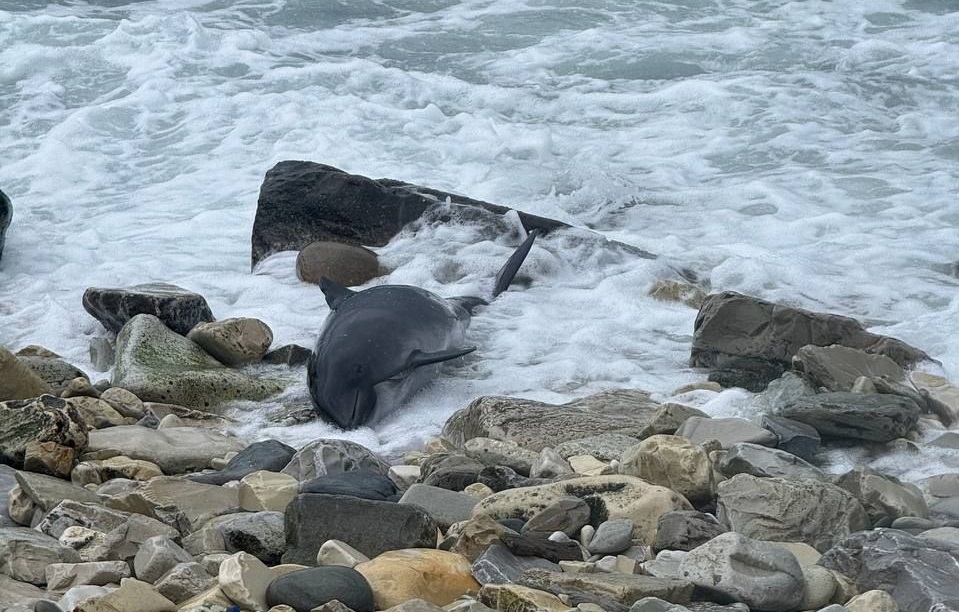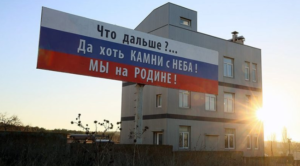Dozens of dead dolphins, hundreds of dead birds, dozens of square kilometers of polluted sea shore – these are the first outcomes of shipwreck in the Kerch Strait on December 15. Sea storm broke and sank two Russian tankers «Volgoneft-212» and «Volgoneft-239» with over 9 thousand tons of fuel oil. In accordance with preliminary data, half of them have already spilled into the sea. The leakage continues as Russian authorities were slow in pumping fuel oil from drowned tankers.
Fuel oil reached sea shores of Anapa in Krasnodarsky krai of the Russian Federation and Kerch in occupied Crimea. It has killed sea species and polluted beaches. Ecologists believe that spots of fuel oil may reach Yalta whereas it will take years to overcome negative outcomes of the shipwreck.
The Kerch Strait is the main corridor of migration for dolphins, birds and fish. Twice a year 38 types of fish use the strait, connecting Black Sea and the Sea of Azov, to reach spawning places. Sea mammals (bottlenose dolphins and harbor porpoise) and dozens of birds, including 22 birds from the Red List of Threatened Species, migrate through the strait.
However, the Kerch Strait has been the most polluted place in the sea. Scholars have regularly registered its pollution by harmful elements. Russian oil traders have turned the strait into transshipment base years ago. Its southern part has been used by Russian pirate fleet for unofficial pumping of oil from ship to ship, in order to hide its Russian origin.

Oil pumping from tanker of type «Volgoneft» to Russian tanker Nadezhfa in the Kerch Strait. Photo: Alexander Demin / MarineTraffic.com
Small tankers of «Rosneft», like «Volgoneft», deliver oil and oil products to the strait and pump them into larger sea tankers. Later these tankers bring them to final destination countries. There are regular oil spills during pumping operations. Russia treats the Kerch Strait and the Sea of Azov as its «internal sea». As an outcome, Russian oil traders have mercilessly polluted them.
The Center of Journalist Investigations published an interview with Pavlo Lakiichuk, head of security programs of Ukrainian Center of Global Studies «Strategy XXI», about Russian greed causing ecological disaster in the Kerch Strait.
Both wrecked ships have been over 50 years old. They should have been already liquidated. Tankers of their type «river-sea» are forbidden to navigate more than 13 miles from the sea shore because large sea waves can easily break them. That is what happened with «Volgoneft-212» – sea storm broke it into parts.

Shipwreck of tanker »Volgoneft 212» in the Kerch Strait in December 2024. Photo: screenshot of video made by crew members
The history does not teach Russians at all. In November 2007, similar tragedy happened in the Kerch Strait. High storm waves broke tanker «Volgoneft-139» whereas four dry cargo carriers sank and eight ships ran aground. Approximately one thousand and a half tons of fuel oil and seven thousand tons of sulfur spilled into the sea.
Ukrainian island Tuzla suffered the most from fuel oil. Both sides of the Kerch Strait have been also polluted.
As ecologists evaluated, over 30 thousand birds died. Fuel oil has resurfaced in coming years. Shipwreck of 2007 has been called the most disastrous shipwreck of a decade. Now Russians beat this record.
The scale of current pollution is larger by several times. It is impossible to foresee its outcomes. Russian authorities have cleaned only 1% of oil spots within last two weeks, as found out Russian media «Agentstvo».

Dead dolphin in fuel oil at the sea shore of Krasnodarsky krai of the Russian Federation. Photo: Oil spill in Black Sea/T.me
Dictator Putin, threatening everybody by his «Oreshnik», called the oil spill in the Kerch Strait «ecological disaster». While Russian public officials decide how to act, volunteers try to clean the sea shore by their hands.
Residents of Russian resort city of Anapa (it suffered the most) collect the sand with fuel oil into bags. However, municipal services do not transport them on time, and fuel oil leaks or sea waves get it back to the sea. Volunteers sometimes find bags left at the beach…
Residents of Anapa use beloved Russian tradition and record video complaints to Russian tsar Putin. They complain that there is a shortage of people and equipment whereas local authorities do not cope…

Collection of fuel oil at the beach of Krasnodarsky krai. Photo: Sergei Malgavko / TASS
Residents ask to send rescue teams, involve scholars for neutralization of harmful materials and address foreign countries for technological assistance. It seems they forgot how Putin refused to accept assistance from USA, Britain and Norway when Russian submarine «Kursk» sank.
Meanwhile, fuel oil has already reached sea shore in Crimea. People collect it into bags at beaches of Leninsky raion and Kerch. Volunteers clean and wash birds and bring them to park «Taigan» for rehabilitation.
Ecologists warn about long lasting negative effects on all species in the sea and on the land. The water will be toxic and will poison fish, mollusk and seaweed. In their turn, they will poison people.

Dead bird in fuel oil at the sea shore near Sudak in occupied Crimea, December 2024. Photo: sudak.rk.gov.ru
«Gasoline, toluene and xylene cause mutations in living species. These elements penetrate into bodies of birds and fishes and make them lethally dangerous for consumption. Even after cleaning of oil spots, toxic materials will stay in the sand and plants for years», as says environmental volunteer Aleksei Gorshkov.
It is unknown how much fuel oil spilled into the sea or still stays in drowned tankers. Spring storms and heated water may get them to the surface whereas winds can disseminate oil spots all over water areas of Black Sea and the Sea of Azov.
The Ministry of Protection of Environment and Natural Resources of Ukraine reports that fuel oil moves in North-Western direction and may reach the Southern sea shore of Crimea. Beach on eastern sea shore of Crimea narrowed as polluted sand has been brought out, as reports «Крим. Реалії». Perspectives for coming resort season are sad. Fuel oil has already reached main resort of Russia – Sochi.

Fuel oil at the beach in Krasnodarsky krai of the Russian Federation. Photo: Oil spill in Black Sea/T.me
Russian authorities gave the status of «emergency of federal level» to the situation in the Kerch Strait. However, Crimean «speaker» Volodymyr Konstantynov suddenly announced that there was no threat to tourist season in Crimea…
Meanwhile, social media have already posted information about cancellation of reservations for New Year in Crimea and Anapa. As Russian media reported, tourists cancelled 90% of reservations of hotels and restaurants in Anapa. 2025 tourist summer season is already under the threat as ecological disaster in the Kerch Strait hit territories where 80% of Anapa hotels are located.







